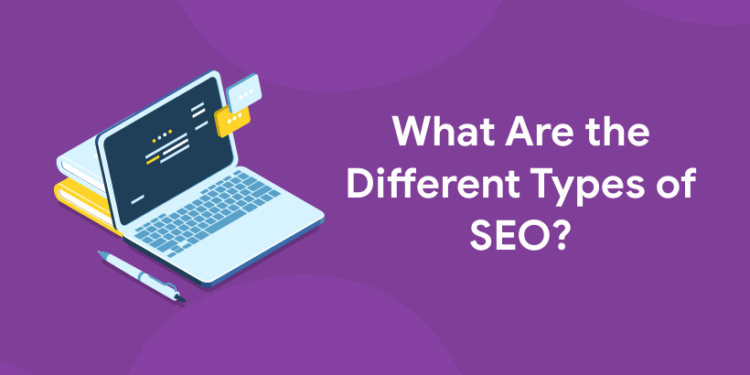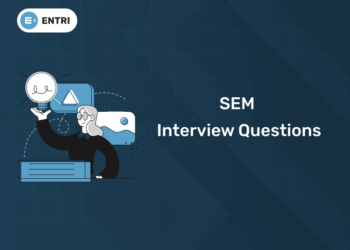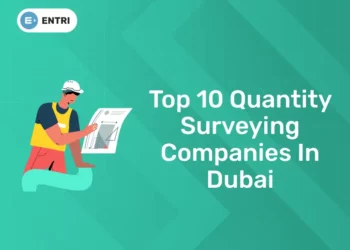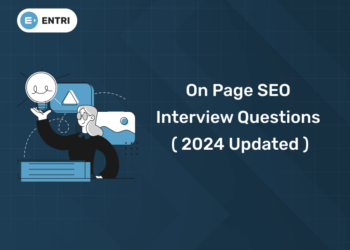Table of Contents
Search engine optimization (SEO) is the process of making changes to your website to help it rank higher in search engine results pages (SERPs). The first step in search engine optimization is choosing the type of SEO you want to do and planning which tools you’ll use to meet your goals. Fortunately, there are plenty of different types of SEO that can help you improve your website, whether it’s improving its performance in local SERPs or getting it to rank higher on mobile devices. Here are the different types of SEO you should know about before starting your next project.
Get the latest updates on digital marketing in the Entri app
When it comes to SEO, there are different types you need to be aware of if you want your website to rank high in search engine results pages (SERPs). These include on-page SEO, off-page SEO, and technical SEO. On-page SEO is about how well your content can answer the questions searchers ask when looking for something. Off-page SEO is about how well other websites link back to yours. Technical SEO focuses on things like page load speed and site architecture. If you’re serious about getting the best possible rankings from Google, make sure that you focus on all three areas of optimization! We’ve put together a list of some essential links for beginners below to help you get started. SEO, or search engine optimization, is the process of improving the visibility and ranking of a website or web page in search engine results pages (SERPs). There are different types of search engine optimization that focus on different aspects of this process, and they can be divided into two main categories: on-page SEO and off-page SEO.
To know more about digital marketing in the Entri app
On-page SEO
You’re undoubtedly familiar with this type of SEO. Everything that your readers will view when they visit your website is considered to be part of on-page optimization. Generally speaking, that means content. High-quality, educational content is the foundation of effective on-page SEO. And not just tangentially instructive; truly effective content must address issues that no other pages are addressing in order to score well (or, at the least, solve those problems better than other available resources). You need to share only the best information. According to Rand Fishkin of Moz fame, it ought to be ten times better than other content available. That’s no joke, however; if your content completely outperforms everything else, it will rank highly.
Get the latest updates on digital marketing in the Entri app
Make sure your content is fantastic because that is the most crucial aspect of on-page SEO. However, there are a lot of other elements that affect how well a page ranks in search results. Keywords, the earlier example I mentioned, are crucial. A lot of pertinent and related keywords should be included while writing a lengthy paper on a subject. However, ensuring that those keywords are fully optimised to achieve your objectives will greatly improve your SEO. For instance, it’s a good idea to use your keyword in the page’s title, URL, opening sentence, and at least one subheading. Additionally, you want your keywords to focus on a single, distinct subject.
On-page SEO, however, extends beyond keywords. It’s also critical to have a user-friendly website because visitors are less likely to remain around to find out more information if it’s difficult for them to navigate. Additionally, good design is vital. In other words, you must concentrate on offering a positive user experience everywhere. On-page SEO may seem to contain almost everything, but that’s only because it plays a major role and is crucial to do properly. Since you’re aiming to attract users, a lot of this optimization is user-focused, so getting it right is crucial.
Enroll in our latest digital marketing course in the Entri app
Off-page SEO
Off-page SEO is more challenging to define. Link building is the first—and possibly most crucial—step in off-page optimization. This is one of the most challenging aspects of SEO and also a very important one. Obtaining links to your website not only increases traffic, but it also demonstrates to Google the authority of your website and the value others place on its content. Having links from reputable websites can have a significant impact on how your site is ranked. Although it can be challenging to quantify the impact of a single link, it is safe to say that getting a good link can give your rankings a significant boost. However, obtaining links from those kinds of websites is really challenging. Backlink construction has become a career for many people. Another off-page indication that has a significant impact on SEO is social media. Search engines consider your material to be valuable and aid in its discovery if people are talking about it on Facebook, Twitter, LinkedIn, or other social networks.
Get the latest updates on digital marketing in the Entri app
Additionally, having material that receives a lot of traffic from social media might benefit your SEO. In order for your post to be successful on social media, you need to put a lot of time and effort into making sure that it is promoted to the channels where your audience is active. However, the rewards might be enormous. Positive off-page SEO strategies include fostering relationships with bloggers, journalists, social media influencers, and the owners of websites that are comparable to yours. Leaving comments on other blogs can be beneficial. Still used frequently for off-page SEO, and guest posting. Spending time on Reddit and pertinent forums might also be helpful. This may not look like much SEO at first, but that’s only because you’ve been concentrating on on-page signals. Off-page SEO focuses on your complete internet presence, which is something that SEO has a lot to do with.
Get free placement assistance with Entri app
Technical SEO
Although some consider technical SEO to be a part of on-page SEO, we’ll be discussing it separately in this article. In a nutshell, technical SEO is connected to on-page elements but focuses on operational issues. Search engines, for instance, might favor websites with responsive designs that adapt well to mobile devices. Another crucial element is page performance; if your page loads slowly, you risk losing visitors and being penalised by ranking algorithms. Your SEO can benefit from image optimization, employing a secure HTTPS connection, caching data to speed up load times, publishing thorough sitemaps, and other technical variables.
Enroll in our latest digital marketing course in the Entri app
Additionally, each page’s HTML needs to be optimized. SEO-related aspects include employing the right kind of redirects, using schema markup to explain to search engines exactly what’s on your page, and making it simple for crawlers to understand what your page is about. Speaking of crawlers, it’s essential to make sure your robots.txt file has been updated to make it easier for crawlers to access the information they need. Although technical SEO can be scary, it is mostly governed by the same guidelines as on-page SEO: a positive user experience is essential. You’ll be halfway there if your website loads quickly and is simple to use. Just make sure that it’s simple for Google’s crawlers to navigate presently.
Get the latest updates on digital marketing in the Entri app
Mobile SEO
SEO for mobile devices is important because people are using their phones more and more to search the internet. Mobile devices have smaller screens, so it’s important to make sure your website is mobile-friendly. This means your website should be designed for a smaller screen and easy to navigate on a touch screen. In addition, your website should load quickly on a 3G or 4G connection. Finally, your website should be accessible from all major mobile platforms, including iOS, Android, and Windows Phone. If you can’t optimize your site for these platforms, then you might want to consider using a responsive design that will resize content depending on the device.
Get the latest updates on digital marketing in the Entri app
Local SEO
There are many of enterprises that have a physical location where they need consumers, even though many businesses exclusively operate online. You can’t make money if people aren’t coming through your door. Therefore, it’s crucial to consider that when performing SEO. In a more conventional search engine optimization strategy, you won’t need to consider a number of procedures that are crucial for local SEO. Making sure, for instance, that your Google My Business page has been claimed will guarantee that your name, address, phone number, hours of operation, reviews, and other pertinent data are prominently displayed in search results and on Google Maps. The listing itself needs to be optimized with quality images, insightful text, and legitimate customer feedback.
Enroll in our latest digital marketing course in the Entri app
Additionally, you must make sure that your contact information is clearly visible and marked up with schema so that search engines can find it. It will be simpler for search engines to display this information to potential clients the more efficiently you present it to them. Aside from being found by local leads, other factors like including a Google Maps marker on your homepage, including a region or city in your page titles, descriptions, and keywords, and displaying awards and trust symbols can all significantly improve your chances of converting those leads into paying customers. Effective local ranking is difficult to achieve, so local firms should place a high priority on local SEO.
Get the latest updates on digital marketing in the Entri app
YouTube SEO
Similar to app store optimization, YouTube search engine optimization targets a certain audience, but it has a significant impact on the volume of traffic you receive. Many people are unaware that one of the most widely used search engines in the world is YouTube, and that ranking for a popular search there is absolute gold. And you can get an even bigger boost if you can rank one of your videos for a typical Google search. So how does content get optimized for YouTube?
Enroll in our latest digital marketing course in the Entri app
Your video needs to be excellent to start with. It must provide answers, offer solutions, or simply be more interesting than what is already available. If your video is excellent, it will draw more views, comments, and subscribers in addition to receiving more loves and favourites. These are all YouTube ranking signals. Similar to your page titles and introductions on text-based pages, your video’s title and description should be descriptive. Google will be able to understand the topic of your movie more easily with a longer, keyword-rich description (without keyword stuffing). It doesn’t hurt to include pertinent keyword tags either.
Get the latest updates on digital marketing in the Entri app
App store optimization
There are several search engines than Google and Bing. The number of searches for app shops is astoundingly high every day, notably for Apple’s App Store and Google’s Play Store. Additionally, if you have an app, you should make every effort to ensure that those stores display it to potential users. On-page SEO and app store optimization are extremely comparable. There are fewer elements that you can control, so you need to concentrate on those even though it’s not always clear which factors are employed in app store search algorithms.
Enroll in our latest digital marketing course in the Entri app
Your app’s icon and title are the first two things users will see, so they need to be both appealing and descriptive. The description must be precise and contain both the keywords that your users are most likely to be looking for and related terms. Your description should contain those keywords in the meta tags as well. There might be a case made for off-page app store optimization as well. It’s feasible that the app store will rank your software higher in searches if you’re able to establish a lot of connections to it. This will probably be a part of a larger SEO campaign for your entire company, but it’s also viable to do this, particularly for an app.
Get the latest updates on digital marketing in the Entri app
Conclusion
There are many different types of SEO, but they can be divided into two main categories: on-page and off-page. On-page SEO optimizes your website’s content and structure to make it more visible to search engines, while off-page SEO promotes your site through link building and other activities. Both are important for a successful SEO campaign, so make sure you focus on both when you’re planning your strategy. It’s also worth noting that there are numerous technical terms used in the SEO world that may not be clear at first glance. Here is a list of some common terms used in SEO to help you understand them better:
Enroll in our latest digital marketing course in the Entri app
A keyword phrase is the words or phrases that people enter into search engines to find what they’re looking for. Keyword research involves selecting keywords based on volume, competition, relevance, and uniqueness which will ultimately increase traffic and conversions from search engine users (aka customers). On-page optimization is all about writing relevant copy with quality backlinks as well as coding quality websites with HTML tags that have good relevancy. If you are interested to learn new SEO skills, the Entri app will help you to acquire them very easily. Entri app is following a structural study plan so that the students can learn very easily. If you don’t have a background, it won’t be a problem. You can download the Entri app from the google play store and enroll in your favorite course.
Get the latest updates on digital marketing in the Entri app











